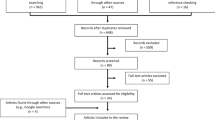abstract
The Work Planning and Performance Review (WPPR) System, developed in a midwestern state as a basis for pay-for-performance decisions in the state government, is described. The WPPR's job relevance was evaluated in one state agency by comparing WPPR scores with scores on a behavioral checklist developed for that purpose. Supervisor and subordinate perceptions of the relevance of the two systems are described. Comparison and perception data indicate the WPPR lacks content validity. Probable impact on the merit pay system is discussed.
Similar content being viewed by others
References
Bernardin, H. J., and Beatty, R. W. (1984).Performance appraisal: Assessing human behavior at work, Boston: Kent Publishing Company.
Borman, W. C. (1979). Format and training effects on rating accuracy and rater errors.Journal of Applied Psychology, 64: 410–421.
Cronbach, L. J. (1951). Coefficient alpha and the internal structure of tests.Psychometrika, 16: 297–334.
Fay, C. H., and Latham, G. P. (1982). Effects of training and rating scales on rating errors.Personnel Psychology, 35: 105–116.
Flanagan, J. C. (1954). The critical incident technique.Psychological Bulletin, 51: 327–358.
Ivancevich, J. M. (1979). Longitudinal study of the effects of rater training on psychometric error in ratings.Journal of Applied Psychology, 64: 502–508.
Ivancevich, J. M., Donnelley, J. H., and Lyon, H. L. (1970). A study of the impact of management by objectives on perceived need satisfaction.Personnel Psychology, 23: 139–151.
Kentucky Legislative Research Commission (1983).Forty-Nine state survey, Frankfort, KY.
Kentucky Legislative Research Commission. Program Review and Investigations Committee (1983).Employee survey on the state's new personnel system, Frankfort, KY.
Latham, G. P. and Wexley, K. N. (1981).Increasing productivity through performance appraisal. Reading, MA: Addison Wesley.
Latham, G. P., Fay, C. H., and Saari, L. M. (1979). The development of behavioral observation scales for appraising the performance of foremen.Personnel Psychology, 32: 299–311.
Smith, P. C. (1976). Behaviors, results, and organizational effectiveness: The problem of criteria. In M. D. Dunnette (Ed.),Handbook of industrial and organizational psychology. Chicago: Rand McNally.
SPSSX users manual (1983). New York: McGraw Hill.
Wallace, M. J., Jr., and Fay, C. H. (1983).Compensation: Theory and practice, Boston: Kent Publishing Company.
Author information
Authors and Affiliations
Rights and permissions
About this article
Cite this article
Fay, C.H., Clark, R.G. Work planning and performance review as a basis for merit pay decisions: An evaluation. J Bus Psychol 1, 276–290 (1987). https://doi.org/10.1007/BF01020816
Issue Date:
DOI: https://doi.org/10.1007/BF01020816




